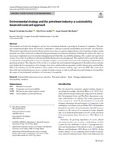Mostrar el registro sencillo del ítem
Environmental strategy and the petroleum industry: a sustainability balanced scorecard approach
| dc.contributor.author | Fernández-González, Raquel | |
| dc.contributor.author | Puime Guillén, Félix | |
| dc.contributor.author | Vila Biglieri, Jorge Eduardo | |
| dc.date.accessioned | 2023-03-29T14:05:17Z | |
| dc.date.available | 2023-03-29T14:05:17Z | |
| dc.date.issued | 2022 | |
| dc.identifier.citation | Fernández-González, R., Puime-Guillén, F. & Vila-Biglieri, J.E. Environmental strategy and the petroleum industry: a sustainability balanced scorecard approach. J Petrol Explor Prod Technol 13, 763–774 (2023). https://doi.org/10.1007/s13202-022-01543-9 | es_ES |
| dc.identifier.issn | 2190-0566 | |
| dc.identifier.uri | http://hdl.handle.net/2183/32804 | |
| dc.description.abstract | [Abstract] The institutional framework designed to protect the environment demands a growing involvement of companies. The new environmental paradigm drives the business community to embrace corporate sustainability more broadly and effectively. This trend is especially pronounced in the petroleum sector since, to a greater degree than in other industries, modern society demands that wealth creation be conducted while guaranteeing social and environmental wellbeing. To achieve this aim, it is necessary to implement an environmental management model that links sustainability planning with a control and supervision system. One of the most effective is the Sustainability Balanced Scorecard approach. This method will be used in this article to evaluate the sustainable performance of a Spanish company whose activity is focused on the marketing and distribution of petroleum products. The objective of this article is to analyze the environmental management of the hydrocarbon company and whether the four perspectives of its strategic vision have satisfactorily incorporated variables that promote sustainability. 2021 is the reference year for the indicator values, which will be compared with the target values for 2022. The results show that, while financial performance reveals a margin for improvement, as well as staff education and training in sustainability, the degree of environmental satisfaction of consumers is acceptable. | es_ES |
| dc.description.sponsorship | Xunta de Galicia; ED481B2018/095 | es_ES |
| dc.description.sponsorship | Xunta de Galicia; ED431C2018/48 | es_ES |
| dc.description.sponsorship | Xunta de Galicia; ED431E2018/07 | es_ES |
| dc.description.sponsorship | Ministerio de Ciencia e Innovación; RTI2018-099225-B-100 | es_ES |
| dc.language.iso | eng | es_ES |
| dc.publisher | Springer | es_ES |
| dc.relation.uri | http://dx.doi.org/10.1007/s13202-022-01543-9 | es_ES |
| dc.rights | Atribución 4.0 Internacional | es_ES |
| dc.rights.uri | http://creativecommons.org/licenses/by/3.0/es/ | * |
| dc.subject | Sustainability balanced scorecard adoption | es_ES |
| dc.subject | Petroleum industry | es_ES |
| dc.subject | Spain | es_ES |
| dc.subject | Strategy implementation | es_ES |
| dc.subject | Sustainability transition | es_ES |
| dc.title | Environmental strategy and the petroleum industry: a sustainability balanced scorecard approach | es_ES |
| dc.type | journal article | es_ES |
| dc.rights.accessRights | open access | es_ES |
| UDC.journalTitle | Journal of Petroleum Exploration and Production Technology | es_ES |
| UDC.volume | 13 | es_ES |
| UDC.startPage | 763 | es_ES |
| UDC.endPage | 774 | es_ES |
| UDC.coleccion | Investigación | es_ES |
| UDC.departamento | Empresa | es_ES |
| UDC.institutoCentro | CITENI - Centro de Investigación en Tecnoloxías Navais e Industriais | es_ES |
| UDC.institutoCentro | CIF - Campus Industrial de Ferrol | es_ES |
Ficheros en el ítem
Este ítem aparece en la(s) siguiente(s) colección(ones)
-
Investigación (FEE) [923]






